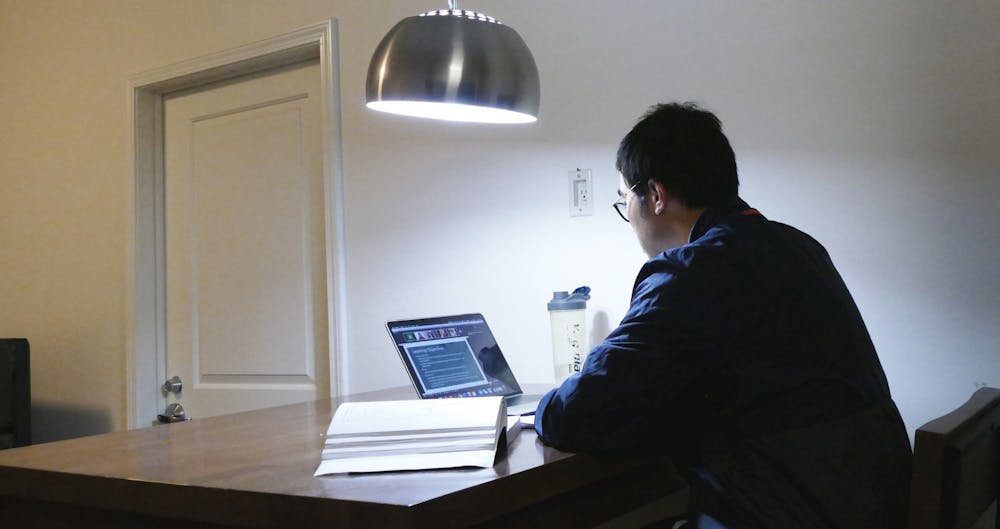中文版请点击此处 | Lea en español
For most students, life consists entirely of sitting in front of a laptop for classes, clubs, interviews and social events. As most everyday activities continue to be conducted online and schoolwork becomes synonymous with homework, many students have contracted a new condition — Zoom fatigue. Beyond a lack of motivation to attend and participate in classes online — a classic symptom of Zoom fatigue — students have been facing a multitude of other issues with online learning that have affected their ability to learn effectively, including Internet problems, family issues and problems with mental health. With the variety of outside concerns, coupled with academics, many students have started to consider whether the University’s current grading policy — standard letter grades — should change.
Student Council launched a survey Aug. 28 seeking to gauge students’ grading preferences this semester. As of Sept. 2, 93.6 percent of 2011 respondents — 99.6 percent who were undergraduates and 0.4 percent who were fifth years — reported facing between two to 13 barriers in learning due to the pandemic.
The survey, which remains open until Oct. 11, was released by Student Council as a way for students to share their preferences for the best grading policy based on their experiences with online learning in the spring and fall semesters. The 14 barriers to learning predefined in the survey included difficulty learning over Zoom, loneliness, time-zone differences, family relationships, mental health, financial insecurity and more. 2.8 percent of respondents indicated encountering no barriers while 3.1 percent indicated encountering all 14.
Of the 14 listed barriers to learning, “hard to focus off-Grounds,” “difficulty learning over Zoom” and “loneliness” were the three most frequently chosen.
Based on the survey’s responses, Student Council concluded that an extension of the spring semester’s grading policy — which registered classes as credit/general credit/no credit but allowed students to opt-in to letter grades — would be the most equitable grading option, eventually passing a resolution in support of its adoption. Additionally, the Presidential Senate — a student body composed of the Student Council president, class presidents and undergraduate school presidents — released a statement in support of continuing the University’s spring 2020 grading policy this semester. The statement also added that students should be allowed to wait until after their final to decide whether they want to take the class as credit/no credit or with a letter grade.
“Taking that credit/no credit option, I don’t believe it means that students are going to be trying less,” said Sophia Liao, Second Year Council president and second-year College student. “I think it’s just a recognition of what we have to go through.”
With midterm season coming up and mandatory dorm-wide COVID-19 testing leading to dorm lockdowns, Liao believes that having this level of mental stress has greatly impacted many people’s abilities to learn effectively. Those who chose to stay home and not come to Grounds have also been losing social connections and feeling isolated. Personally, she has also experienced Zoom fatigue and the feeling of not being motivated enough to learn.
Liao acknowledged, however, that students are not the only ones struggling with online learning.
“There’s an impact not only to us and our learning but also to professors’ abilities to be able to fully teach us the things they need to teach us,” Liao said.
The Young Democratic Socialists at U.Va. began a petition Tuesday to demand that the fall semester be credit/no credit.
“There’s a myth that our grades are what make us an elite university, but in reality they are means-testing to disproportionately hurt those with learning disabilities and less access to resources,” the petition stated. “Even for the best student, online classes fundamentally alter the learning experience.”
As of Wednesday, the petition has collected over 450 signatures.
Many students and organizations have also signed an open letter to the deans, Provost Liz Magill, President Jim Ryan and the University community demanding that the University adopt a default credit/general credit/no credit grading system with opt-in letter grades.
“This is an unprecedented time with unimaginable challenges placed on faculty, staff and students alike, but we must rise to meet this moment with empathy and moral courage,” the letter stated. “In the midst of an ever-changing global pandemic, our response must dynamically reflect the need for compassion and care.”
As of Wednesday evening, nearly 750 students have signed the letter.
Fourth-year Education student Nia Augustine believes that the University should extend its spring grading policy. As a pre-med student, certain classes need to have letter grades in order to satisfy medical school requirements. However, the current political, social and economic climate has placed a lot of pressure on students and made it difficult to perform well.
“Looking at the inaccessibility of resources for specific communities of students, what if they can’t submit [an] assignment on time because they have to drive 30 minutes to the nearest Internet station or they don’t have printers or they don’t have ink?” Augustine said. “All these different factors can really take a toll on people’s mental health and I think the added pressure of having to get a grade on something would push people to do things that they would later on regret and put their academic work at jeopardy as well as their integrity.”
Despite being more than half a year into the pandemic, Augustine does not think that things have been getting better. People are no longer receiving the unemployment benefits they had in March and resources are depleting, but COVID-19 is not going anywhere.
“We’re not in normal times and I don’t feel like we should be grading people normally,” Augustine said. “The University needs to have some compassion and empathy and realize that we’re all going through [a lot].”
Second-year College student Zhiwen Xu agrees that the spring semester grading option should be continued and also wishes that the curve be lowered for classes, whether that be through a lower grading scale, changing the format of tests or professors being easier in general when grading.
Xu especially believes that professors should be more flexible about turning assignments in late. For her organic chemistry exam, she needed to scan her work and upload it online, and while she was able to do so, she worried about students who didn’t have smartphones. She knows people who only have flip phones that can’t take pictures, which becomes a big problem when it is a necessary component of an assignment.
“Last time I had a class [where] the professor wanted us to take our own photo for our art project, and [my friend] had to borrow other people’s phones because she didn’t have a camera or smartphone,” Xu said. “She asked me to help her take a picture because she couldn’t.”
Personally, Xu has already experienced two instances of Internet problems. The day before her biology exam, the Internet was unstable for two hours and she had difficulty getting her work done and turning in her assignments. Then Monday, due to thunderstorms in her region, the power went out in her house for five minutes and she lost Internet connection. Beyond Internet problems, she also said that life during COVID-19 is vastly different because of the heightened need to be conscious of yourself and your surroundings in order to avoid spreading the virus.
“Before, you’re at school, you’re just focused on your grade, but now you have to get food, and at the same time try not to give [the virus] to your roommate, for example,” Xu said. “You always have to think.”
Other students believe that, despite the potential problems surrounding online learning, the grading policy should remain as is and reflect the amount of learning and work that students devote to their classes.
“This semester is not a sudden transition and uprooting of students from Grounds to take online classes,” second-year College student Haile Mokrzycki said. “Granted, there are still extraordinary circumstances for some students, but for most, it is not suddenly being sprung on these people like it was last semester. U.Va. has resources and funding that can benefit these students who are still facing dire circumstances because of the pandemic.”
Mokrzycki struggled with online learning during the spring semester and was anxious about her grades because she had difficulty learning how to separate work from personal time. Despite these setbacks, she was able to learn from her shortcomings, following her father’s advice to “adapt, improvise [and] overcome.” While the spring semester left many students feeling stressed and overwhelmed, she believes that faculty and students have learned from the spring, and there can now be a return to the letter grading system in order to keep the grading field even.
However, Mokryzcki emphasized the importance of recognizing that the COVID-19 pandemic is not over and that the University should continue to work with students to provide the resources needed for attaining educational success.
“No student should have to struggle through this semester alone, and by pointing a student to the right resources and guidance, they can still be successful no matter what,” Mokryzcki said.
Deputy University spokesperson Wes Hester told The Cavalier Daily at the beginning of September that the University “has returned to its traditional letter grading system for the 2020–21 academic year” and that the credit/no credit grading framework was only instituted in the spring due to the “unexpected and rapid move to online instruction mid-semester.” The faculty senate will be having a meeting to discuss Student Council’s credit/no credit policy proposal Oct. 6.
Some have criticized the credit/no credit system because it might make students less willing to put effort into their schoolwork, but according to Augustine, a credit/no credit option will not affect students’ abilities and desires to work hard.
“People are still going to take the work seriously,” Augustine said. “It’s U.Va. It’s still a grade to us, [even if] it’s not really a grade.”





